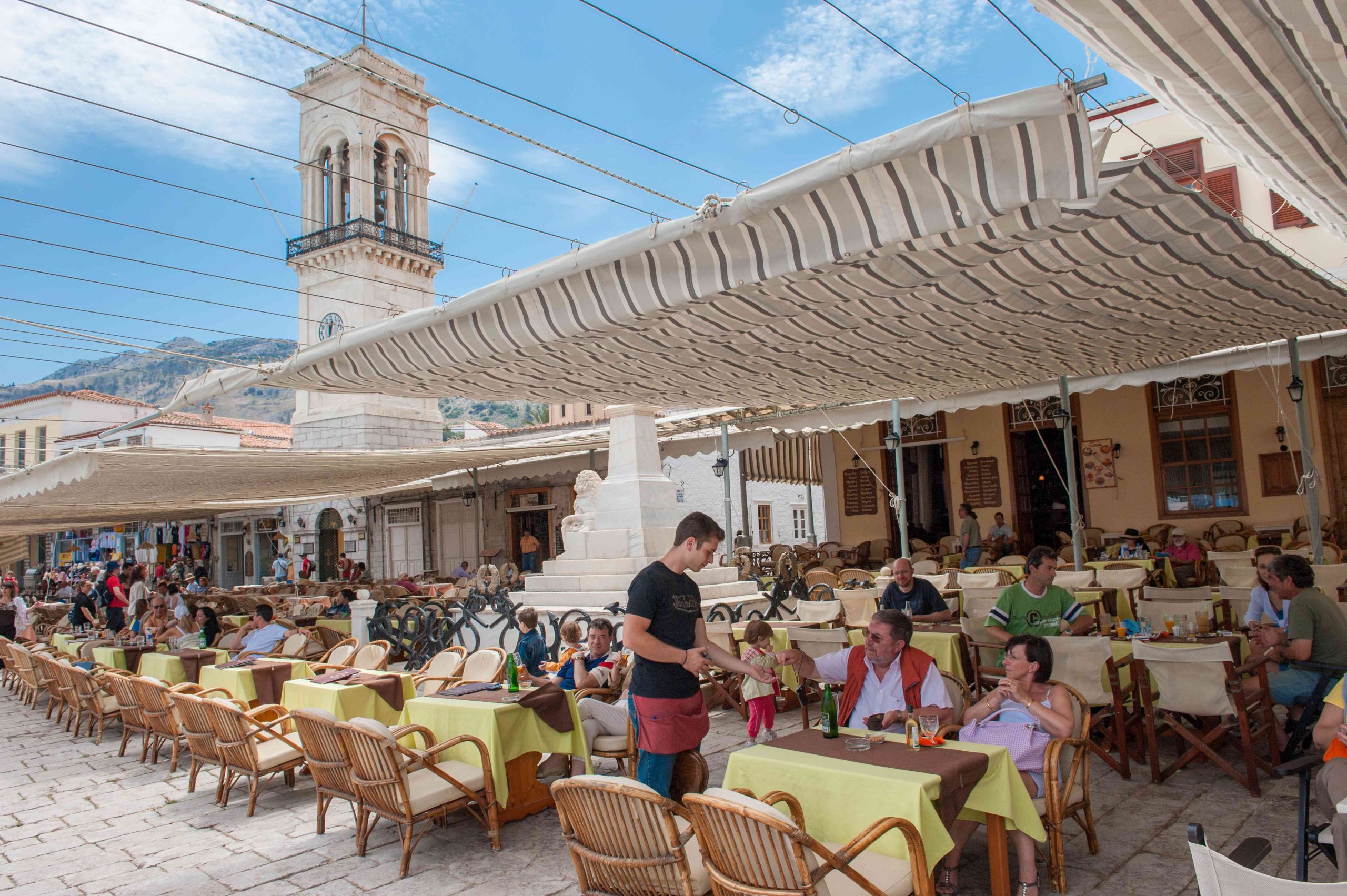The season—or, pronounced correctly, “sezon”—begins at the end of April and lasts through October. The advertisements are already popping up online: “Looking to recruit a receptionist for the summer season, April-October” or “Good knowledge of English is a must. Accommodation, meals and full insurance provided.” One even boasts: “Everything legal!!!”
The summer sezon, whose jobs are largely filled by thousands of young people from across Greece who relocate to islands and beach-front towns for the summer, is one of the tent poles that props up Greece’s ever-expanding tourist season. These workers on sezon are the wait staff, cooks and kitchen staff, hotel receptionists, housekeeping staff and bartenders who serve tourists from Crete to Mykonos and Halkidiki to Santorini. When a young person says they are going to work the sezon, it is understood that they mean this summer tourist season, somewhere far-flung and beachside.
Youth unemployment in Greece is high – the latest ELSTAT data has a 16.8% unemployment rate for young people aged 15–24. But the rate was higher than that for a long time: even last summer, Greece was fourth worst in the European Union with an unemployment rate of 22.5% for the under 25s. These young people (and many who are older) can often only find jobs in the summer, in the hospitality sector.
According to the research branch of the Greek Tourism Confederation, in 2023 there were over 382 thousand hospitality and catering workers across Greece. In the summer of that year, the sector accounted for over 10% of full-time jobs in the country. And it keeps growing every year.
Many of those jobs are in more remote locations, on the picturesque islands and beaches to which tourists flock. In 2023, across the Ionian Islands and the South Aegean, over one quarter of all employment in the region was in accommodation and catering services.
These sezon jobs are, as the job listings boast, a package deal. Many positions include accommodation and meals. In exchange they ask for workers with “a very good knowledge of the English language” and the “speed and ability to work under pressure.” Salaries generally range from €1,000 to €2,000 per month, though in some spots and in some positions they can inch a little higher.

For many young Greeks, a salary of say €1,400 a month is double what they would make in Athens or Thessaloniki. So this live-in summer work, crammed into on-site hotel rooms or nearby apartments, living off the food left over from the buffet, away from the cities for months on end, is a norm for many young people across Greece – an inescapable fact for those that have to pay rent and one of the few ways to make it through the year financially.
Another inescapable fact is that these jobs are rife with mistreatment and violations of basic workers’ rights. Stories of workers working 12-hour-plus shifts in the hot sun serving coffees and cocktails are common. Days off are rare. Often, workers are contracted for half their salaries, with the other half paid under the table without insurance.
A survey into the issue conducted by the Heraklion Food and Tourism Union on Crete revealed that 34.8% of respondents received only one to two days off per month during the tourist season, while 8.8% reported being overburdened with little to no time off at all. Underinsured work is common, with 8.7% of workers claiming they were undercompensated with regard to the insurance owed for their hours of work. And mistreatment is standard: over 67% of workers reported witnessing incidents of sexual harassment, while 61.40% encountered incidents of racism.
Reports of workers underpaid or denied payment have become commonplace, and headlines of seasonal workers being beaten, sexually harassed, or put in impossible conditions hit Greek headlines at least twice per summer.

This photo of a young waiter, wading through the sea with a tray in hand to serve customers at a beach bar in Rhodes, made headlines across Greece in 2023.
And it seems conditions are getting worse. The Panhellenic Federation of Food and Tourism Workers has raised alarms about the growing number of vacancies in the sector, which rose year-on-year to reach 80,000 plus in 2024. The union argues that the intensification of work each season, exacerbated by these vacancies, has deterred many young workers from returning to the sector.
Many sezon workers are also foreign-born workers, either those who have received work visas specifically for seasonal work, or have more permanent residence. However, as part of a broad crack-down on immigration, Greece has reduced the number of visas it will make available for foreign workers in 2025 by over 58,000, with the Greek Financial Courier estimating that these workers will barely cover 25 percent of the existing vacancies, many of which are in seasonal work.
Tourist arrivals continue to increase, with 2024 a record year. So it is likely that, with still more tourists and even fewer workers this coming summer, the workload on all hospitality workers will ratchet up even higher.
Workers’ unions, which have long argued for better conditions and protections, recently securing collective bargain agreements for hotel employees. And starting this year, Greece is also mandating the use of digital work cards in the tourism, hospitality and catering sectors in a step to increase regulation.
But the simple fact of the matter is that tourist arrivals are sky-high, and that the conditions in which seasonal employees work are forged in a pressure-cooker of customer demand and situations where bosses wield absolute control over their workers’ lives.
And young workers still have few other options. The end of the 2024 season saw 133,300 jobs shed in the tourism and food industries. These jobs and more will all be filled again this year.
Young people are already on the hunt: “Hello I am 23 years old with 5 years’ experience and have worked 3 sezons,” reads one typical Facebook post. “I am looking for a job in a service position. Excellent knowledge of English, looking on the island of Paros for something with accommodation and food.”



